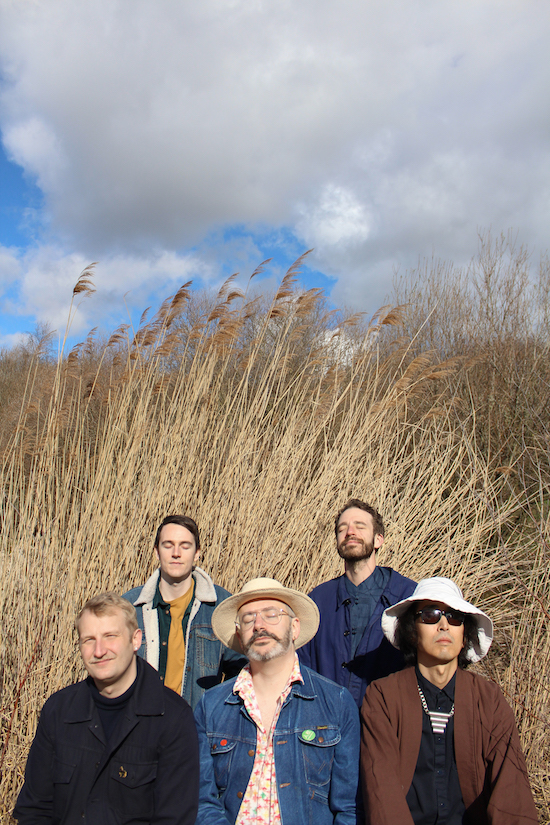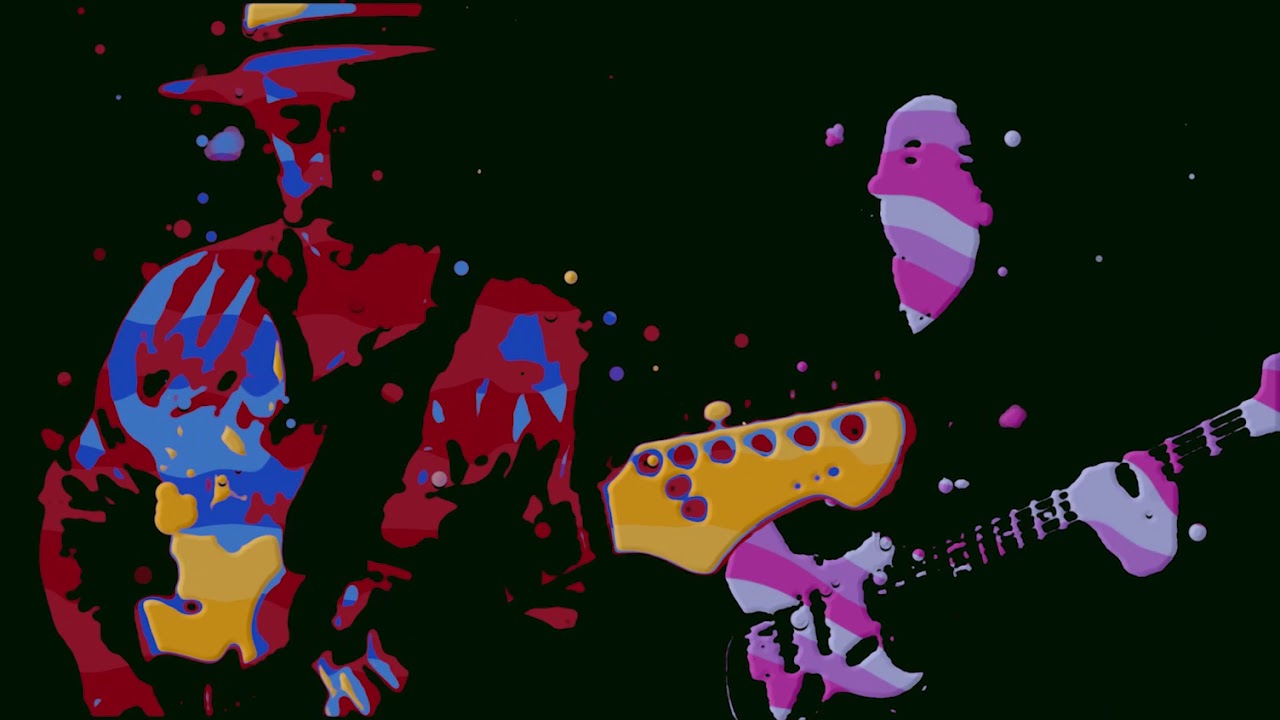“I think shortened attention spans have been detrimental to pop music,” Rob Smoughton, leader of London’s Black Peaches, declares. “It’s infuriating. Imagine if Brian Wilson wrote ‘Heroes and Villains’ now! Would Freddie Mercury be told to trim down ‘Bohemian Rhapsody’? ‘Do we really need the second ‘scaramouche’…?’”
Smoughton’s addressing the fact that Fire In The Hole, the second album by his colourfully eclectic sextet – which also features among its ranks Vanishing Twin’s Susumu Mukai (a.k.a. Zongamin) and The Severed Limb’s Charlie Michael – contains just one song, ‘The Black Peach Boogie’, that’s less than four minutes long. The other six? Two clock in around the five-and-a-half minute mark, another just over seven, two a little more than eight, and one, ‘Barracuda’, is a good ten minutes long. Even those five-minute tunes – ‘Spice Route’ and ‘Pillars Of Hercules’, which provide the album’s prismatic climax – are intertwined. It’s a far cry from Hot Chip, with whom Smoughton played in their early days, and to whom he returned in 2009, and it’s no less removed from his work with Scritti Politti, whose Green Gartside he met via Hot Chip’s Alexis Taylor a decade or so ago. Brevity, it has to be said, isn’t Black Peaches’ preferred approach.
“I love a long song,” Smoughton confides. “The biggest problem I ever face is editing tracks for radio or for vinyl sides. I don’t know whether it’s a combination of separation anxiety or bloody-mindedness. I like a journey. 3-in-1 songs: ‘Rosalita (Come Out Tonight)’ by Bruce Springsteen, Billy Joel’s ’Scenes From An Italian Restaurant’ and Cat Stevens’ ‘Sun/C79’ have been on heavy rotation since I can remember. Stephen Stills ‘Bluebird Revisited’ is possibly my favourite. Wonderful stuff! I’m into musical suites, less into prog rock, despite how Black Peaches might sound.”
So how do Black Peaches sound? Well, Springsteen, Joel, Stevens and Stills have all played their part. So, too – judging by Fire In The Hole – have Dr John, Buffalo Springfield, Fela Kuti, Guy Clark, Os Mutantes, Little Feat, Novos Baianos, Traffic, Todd Rundgren, Baden Powell, Supertramp, Barefoot Jerry, and a whole host of others whose albums would have been found mouldering in early 90s thrift stores, but which have since become prized possessions for cratediggers. Indeed, tQ’s John Doran recently described them – approvingly – as sounding at times like “a second-hand record from 1978 featuring Don Fagen, Warren Zevon, and various ex-members of Chicago Transit Authority.” Certainly, their attention to period detail is convincing, and if unearthing an album that mixes the late 1960s and 1970s West Pacific coastal vibes with the same era’s tropicalia, Afrobeat, funk and even yacht rock has always been your ambition, it’s going to cost you a great deal less than expected.
“I don’t know why this is my happy place,” Smoughton replies, when asked what led him to such styles. “My parents, particularly my Dad, listened to music a lot. They weren’t pushy. They didn’t try and make me listen to the music of their youth. I just did because it was in the house. But I became an avid record buyer at about the age of 10. There’s something in the quality of music made between the late 60s and the late 70s that just feels right to me. It really is a high watermark for studio musicianship, audio electrical engineering and song writing.
“At the risk of coming across as the nerdy audiophile cliché,” he adds, laughing, “a well EQ-ed kick drum, some hi-hats with just the right amount of sizzle, and a touch of compression: I’m sold. Dr John’s records with The Meters, produced by Allan Toussaint, sound glorious. Thomas Jefferson Kaye made Gene Clark’s No Other such a huge masterpiece. Gilberto Gil’s Expresso 2222 is bliss. More often than not, I like the sound of certain studios rather than bands: Criteria, Wally Heider’s, Sunset Sound… I’ll always check the liner notes.”
If this all sounds like Smoughton’s prepared a merely nostalgic dish, such fare is something of which the 41-year-old is wary. “I try and make music that is personal and original for me,” he says. “I squirm at the term ‘retro’, though. The past 50 years or so have seen such an explosion in musical development that anything starts to sound retrogressive after a couple of years. What I try to do to avoid re-treading old ground is to create music that does something interesting with the form: to push and pull the verse structure, the time signatures and the combination of instruments, to move far enough away from what’s considered ‘normal’, but to still honour an understanding of popular music.”
In some senses, consequently, Black Peaches could be accused of occupying muso territory, but they’re also as instinctive as they are considered. ‘Lemonade’ starts out riding a Southern-fried Americana groove before Latin percussion kicks in and dirty blues riffs – over which Led Zeppelin and ZZ Top might have squabbled – are busted out. ‘Cuatro Berimbau’ drifts in on a gentle South American breeze, then picks up where Harry Nilsson left off, while ‘Barracuda’ recalls early 70s Stevie Wonder, concedes to its mild fondness for prog, then slides off into psych-rock space. The title track, too, cranks up the amps, its rhythm hammered out at breakneck speed till the band reach a crossroads where rock and rockabilly meet.
In addition, Smoughton doesn’t take himself, or his music, entirely seriously. Though Black Peaches steer clear of pastiche, there’s nothing guilty about their pleasures. Fire In The Hole overflows with moments which celebrate the sheer, foolish, inexplicable joy of playing music: an irresistibly cunning chord shift or an off-the-hook rhythm, a fluid change of time signature or the implementation of a kickass riff. Songs may be extended, and their performance nonchalant, but they’re too carefully structured to be deemed ‘jams’. Black Peaches, in other words, will doubtless provoke more than their fair share of air guitar and drums, but don’t deserve the sheepish grins that sometimes follow such actions. Moreover, the band’s playing seems to insist, if you’re going to smile, you might just as well beam.
“Humour is very important to me,” Smoughton admits, “and it can appear in the most surprising places. I don’t want to disturb the creative flow by self-censoring. Will Oldham and Bill Callahan have written songs with a depth of humour: not jokes, but with a brilliant sense of themselves and of their subjects. I don’t have many reservations about mixing music and amusement at all. I have no need to be too honest or too strict. Music should make us feel free and uninhibited. Pull shapes and adopt poses with gay abandon!”
With Hot Chip’s latest, A Bath Full Of Ecstasy, on the horizon, and, Smoughton divulges, a new Scritti Politti album not far away – “We’ve been playing some new songs live for a year or so,” he says, “but it’s all quite enigmatic” – the Black Peaches mastermind isn’t going to struggle when it comes to exploring his multiple musical interests. “I’ve got a pretty wide taste,” he concludes. “It thrills me that there are so many different permutations with just twelve notes and the subdivisions of beats in a bar. If music interests me, then it takes root inside, and I’m never too sure how it’ll come out. I’m just so grateful that I get to play the music I love with the people I love. Sometimes it feels like there’s a lot of spinning plates, but I think it’s actually the way I want it.”
Black Peaches’ new album, Fire In The Hole, is released by Hanging Moon Records on 17 May. They tour throughout the summer. Click here for full list of live dates



